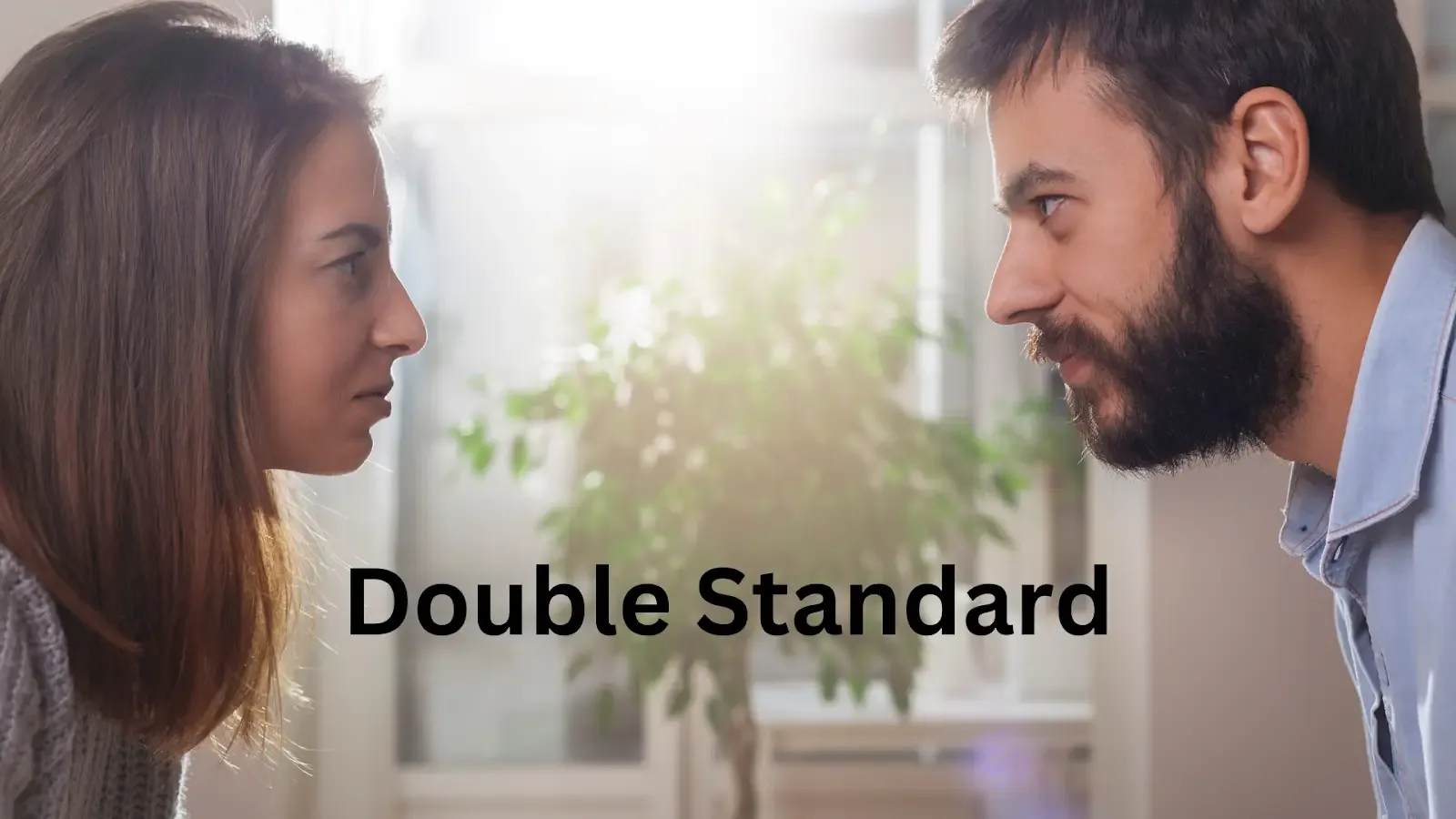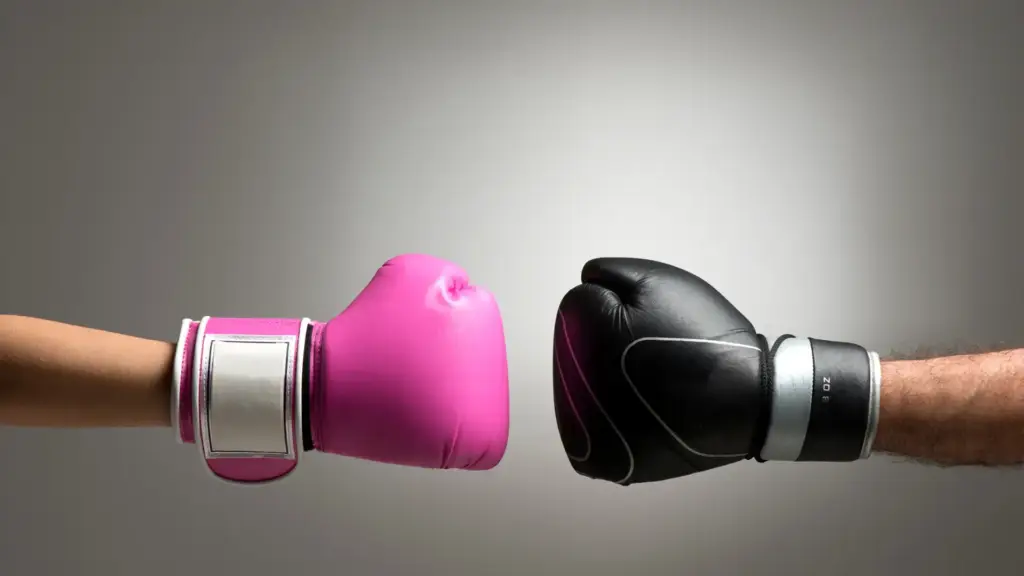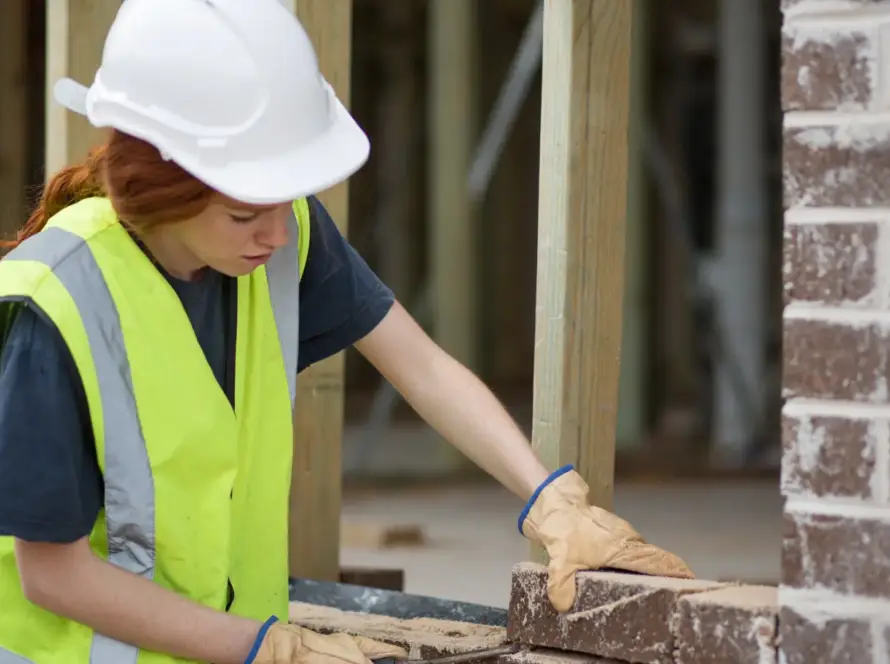
Let’s talk about double standard!
That sneaky little monster that pops up in relationships, work, and even grocery store aisles.
Ever noticed how he “forgets” your birthday and it’s “adorable”?
But the moment you forget to wash his favorite gym shorts, it’s like you’ve committed a federal crime?
Double standards are absurd!
They’re alive, well-fed, and often ignored.
But not today!
Today, we’ll laugh at them, call them out, and maybe even realize how we accidentally keep them alive.
Grab your coffee.
Let’s dive in.
What Is a Double Standard? A Quick Reality Check
A double standard is simple.
It’s one rule for one person and a completely different one for someone else.
Like when men are “passionate” during an argument, but women are “too emotional.”
Ugh!
The tricky thing about a double standard?
It’s sneaky.
It often shows up in moments so small that we don’t even notice it.
Think about it:
He gets praised for being “ambitious” when he works late.
You work late?
Suddenly, you’re “neglecting your family.”
If he orders dessert, it’s “treat yourself!”
You order one, and someone whispers, “Are you still on your diet?”
It’s like society took one big script, scribbled “rules for men” in bold letters, and tossed women a completely different version.
But here’s the kicker: these expectations didn’t just fall from the sky.
They’ve been passed down like a bad family heirloom.
The biggest problem?
Most people don’t even see it happening.
It’s brushed off as “just how things are.”
You’re told not to take it too seriously.
But double standards should be taken seriously because they’re exhausting, outdated, and, honestly, just plain unfair.
And here’s another reality check: they’re not always men vs. women.
Sometimes, it’s women judging other women, or people holding themselves to harsher standards than others.
Ever seen a mom criticize herself for not being “perfect,” but pat her partner on the back for “trying?”
That’s a double standard too.
Recognizing it is the first step.
Laughing at it?
That’s step two.
Because when you spot a double standard, it’s hard not to notice how absurd it is.
The Relationship Double Standards No One Talks About
1. The “Emotional vs. Crazy” Standard
Here’s the deal: When he’s upset, people say he’s “deep.”
He’s “sensitive.”
He “cares too much.”
Meanwhile, when you’re upset, suddenly you’re “dramatic” or “crazy.”
Excuse me?
Since when did having feelings come with a gender label?
Let’s break this down.
If he gets quiet and moody after a fight, it’s “Oh, he just needs time to process.”
But if you’re quiet after a fight?
Suddenly, you’re “giving the silent treatment.”
Like, make it make sense!
And don’t get me started on crying.
If he sheds a tear during a movie, he’s “in touch with his emotions.”
You cry?
“Wow, you really need to pull yourself together.”
Why does it feel like tears come with a PR team for men but a shame bell for women?
2. The “Looks Don’t Matter” Hypocrisy
This one is everywhere.
He lets himself go a little?
Boom, he’s a “real man” with a “dad bod.”
Social media applauds him like he’s reinvented masculinity.
Meanwhile, if you gain 5 pounds, someone’s offering unsolicited weight loss tips like they’re Dr. Phil.
And let’s talk about aging.
Gray hair on men?
“Distinguished.”
Wrinkles?
“He’s aging like fine wine.”
But gray hair or a wrinkle line on you?
It’s “Time to book that Botox appointment, babe.”
Oh, and gym habits?
If he skips workouts, it’s because “he’s so busy providing.”
You skip the gym?
It’s “Don’t you care about your health anymore?”
Stop!
Just stop!
Women can care about themselves and rest, just like men.
3. The “Chores Hero” Standard
Ah, my favorite.
The bar for men when it comes to housework is so low, it’s practically buried underground.
He takes out the trash?
Someone send the man a trophy.
He puts the kids to bed?
Someone call the mayor… this hero deserves a parade.
Meanwhile, you do the dishes, laundry, grocery shopping, AND clean the house, and what do you get?
A nod.
Maybe.
If you’re lucky.
Here’s where it gets worse: some people call this “helping.”
As in, “He helps around the house so much!”
Girl, no!
Helping implies the house is your job, and he’s doing you a favor.
It’s not!
It’s both of your responsibilities.
Equal partnership means sharing, not helping.
And don’t even start with parenting.
“He’s watching the kids today!”
Oh, is he?
Or is he… being their father?
Because last I checked, parenting wasn’t a weekend hobby you volunteer for.
4. The “Who Apologizes First?” Rule
This one’s sneaky.
After a fight, how often are women expected to “be the bigger person” and apologize first?
Men get to sit back, arms crossed, waiting like royalty for us to come around.
If you hold out longer?
You’re “stubborn.”
But if he holds out?
He’s “still upset, just give him time.”
Why is patience heroic for him but petty for you?
These double standards are subtle, yet they’re everywhere.
They creep into arguments, compliments, and even the tiniest moments, like who gets to control the TV remote.
Relationships should feel like a team sport, not a lopsided game where one person gets gold stars for showing up and the other gets judged for everything they do.
The good news?
Once you see these double standards, you can’t unsee them.
That’s when the fun part starts: calling them out and flipping the script.
How We (Unknowingly) Reinforce Double Standards
Here’s the uncomfortable truth: sometimes we play into the double standard without even realizing it.
It’s not always society or “men” to blame, sometimes we’ve unknowingly internalized these ideas ourselves.
1. The “He’s Babysitting the Kids” Comment
We’ve all done it.
You’re out with your girlfriends, and someone says, “Oh, he’s watching the kids today.”
Excuse me…watching?
He’s their father, not a teenage babysitter you found on Facebook.
Why do we celebrate fathers for doing basic parenting?
Imagine the confusion if someone said, “Wow, you’re watching your kids today? You’re such a great mom.”
Ridiculous, right?
It’s the same thing.
2. “Boys Will Be Boys”
How many times have we laughed off something with, “You know how men are…”?
Messy rooms, bad communication, lack of planning, it’s all brushed aside like men are inherently incapable.
Spoiler alert: they’re not.
They’re just used to the world letting them slide.
By excusing this behavior, we keep the double standard alive.
If we hold ourselves to high expectations, we should do the same for our partners, brothers, and sons.
Equality means no free passes.
3. The “Appearance Apologies”
Have you ever caught yourself apologizing for how you look?
“Ugh, I look so tired. Sorry about my hair!”
Meanwhile, he rolls out of bed looking like a caveman and no one blinks.
By constantly apologizing for being less than “perfect,” we reinforce the idea that women have a different standard to meet.
Newsflash: It’s okay to just exist: messy bun, no makeup, and all.
Stop apologizing for being human.
4. Over-Praising Bare Minimum Effort
Let’s say he does the dishes or folds the laundry.
What do we do?
“Oh my gosh, thank you so much! You’re the best!”
Meanwhile, you’ve been running the household like a pro for months, and no one’s handing you a trophy.
Here’s the thing: appreciation is great.
We should show gratitude for each other.
But let’s stop acting like basic life skills are some grand achievement when men do them.
Instead, normalize equal effort without the standing ovation.
5. Judging Other Women (Yes, We Do It)
Here’s a tough pill to swallow: sometimes women reinforce double standards for other women.
Ever hear someone say, “She works too much; her poor kids.”
Or, “She’s so focused on her appearance, so shallow.”
Meanwhile, a man doing the same thing?
“He’s providing for his family.”
Or “He just likes to take care of himself.”
See the difference?
We need to support each other, not tear each other down.
If we want double standards to die, we can’t keep fueling them from the inside.
The truth is, we’ve been conditioned to see some of these things as normal.
But once you notice how we accidentally reinforce them, you can’t unsee it.
The good news?
Small changes go a long way.
Start by dropping the unnecessary “thank-yous” for basic tasks, stop apologizing for being yourself, and call out unfair expectations, even the ones we’ve unknowingly placed on others.
The double standard isn’t going to fix itself, so let’s stop feeding it.
Equality starts here, one small shift at a time.

Double Standards Aren’t Just for Relationships
Double standards don’t just hang out in romantic relationships.
They’re like glitter: everywhere, and impossible to ignore once you spot them.
From social media to careers, they sneak into every corner of life.
1. Social Media vs. Real Life
Let’s play a game: A guy posts a gym selfie.
What does he get?
“Wow, bro, killing it! Stay motivated!”
Now, a woman posts the same selfie.
The comments?
“She’s just fishing for attention.”
Or worse, “Put some clothes on.”
Why do men get cheered on for confidence, but women get criticized for seeking validation?
Confidence isn’t gendered, people.
Oh, and here’s a fun one: A dad posts a picture of him making lunch for his kids.
He’s “Dad of the Year.”
A mom posts the same picture?
It’s just… Tuesday.
Where’s her award, huh?
2. Career & Ambition
The workplace is double standard central.
A man speaks up in a meeting?
“He’s confident and assertive.”
A woman speaks up?
“She’s aggressive.
Calm down, Karen.”
And let’s talk about promotions.
If a man works late, he’s “dedicated to his career.”
A woman works late?
“I hope she doesn’t burn out.
Shouldn’t she be home with the kids?”
Oh, and if you don’t want kids?
Cue the double standard.
Men get a free pass.
“He’s focused on his goals.”
Women?
“You’ll regret that decision someday!”
No one’s asking him to explain his life choices over brunch.
3. Friendships and Social Life
Here’s another gem: If a guy has a close group of friends, he’s “loyal and dependable.”
A woman with a tight group?
People start whispering: “They’re probably so catty.”
Why is female friendship automatically assumed to be toxic?
Women can bond without secretly plotting each other’s downfall, thank you very much.
And let’s not forget about partying.
He goes out on the weekend?
“He’s blowing off steam.”
You go out?
“Is she being irresponsible?”
Like, calm down, Janet…I had one margarita.
4. Aging and Appearance
Double standards around aging deserve their own TED Talk.
A man with wrinkles?
“He’s so distinguished. He’s aging like Clooney!”
A woman with wrinkles?
“Has she considered skincare treatments?”
Gray hair?
Same deal.
He gets labeled “wise and rugged.”
You?
“She’s really letting herself go.”
Why does society treat women’s natural aging like a crisis but celebrate men’s as a glow-up?
And let’s talk about fashion.
If a man wears the same shirt three days in a row, it’s “low-maintenance.”
If you do it?
“Is everything okay at home?”
These double standards don’t just affect women, they affect everyone.
But women feel them harder because the expectations are always stacked higher.
The good news?
The minute we start pointing them out, we take away their power.
So whether it’s at work, on Instagram, or in real life, let’s keep calling them out.
Because fairness isn’t a luxury, it’s what we all deserve.
How to Spot and Call Out Double Standards… Nicely
Spotting double standards is like playing detective in your own life.
They’re everywhere!
Hidden in conversations, compliments, and everyday situations.
Once you notice them, it’s hard to look away.
But calling them out?
That’s where it gets tricky.
You don’t want to start a fight or come across as preachy, but you also don’t want to let it slide.
Here’s how to handle it like a pro: calmly, firmly, and with a sprinkle of humor.
Humor is your secret weapon!
It disarms people without making them defensive.
Let’s say your partner gets praised for “helping” with the kids.
Instead of rolling your eyes into another dimension, try:
“Wow, I should get a trophy too. I’ve been ‘helping’ for months!”
Or: “Do we celebrate basic human functioning now? Should I clap next time he ties his shoes?”
Delivered with a smile, these comments highlight the ridiculousness without turning the moment into an argument.
People are more likely to reflect when you make them laugh first.
Sometimes, the best way to point out a double standard is to ask a question that makes people pause.
It’s like planting a little seed of awareness.
Examples:
“Why is it cute when he forgets, but careless when I do?”
“Isn’t it funny how no one calls a man bossy when he’s leading?”
“So… is ‘being tired’ an acceptable excuse only for him?”
These questions are subtle but powerful.
They nudge people to think about their words and actions without you having to lecture them.
When you spot a double standard, stay calm and address it directly, but kindly.
Sometimes people genuinely don’t realize what they’re saying or doing.
For example:
If someone praises your husband for “babysitting” the kids, you can gently correct them:
“Oh, he’s not babysitting, he’s parenting. Same as me.”
If someone comments on your appearance differently than his, respond with:
“It’s funny how men can age naturally and it’s ‘distinguished,’ but for women, it’s a crisis.”
Being calm takes the sting out of your words while still getting your point across.
Actions speak louder than words!
If you want to shut down double standards, start by modeling equality in your own life.
Stop over-praising men for doing the bare minimum.
Thank them, sure, but treat their contributions as equal to yours, not extraordinary.
Drop the unnecessary self-apologies.
No more “Sorry I look so tired.”
You’re a human being, not a photo filter.
Challenge your own assumptions: Are you holding other women to harsher standards than men?
Check yourself and reset those thoughts.
When you treat everyone equally, it sets a tone that others can follow.
Sometimes it’s not about one specific moment but a pattern you’ve noticed.
Instead of blowing up during an argument, address it later with a calm conversation.
For example:
“Hey, I noticed that when I get emotional, it’s labeled as dramatic.
But when you do, it’s seen as justified.
Can we talk about that?”
Pointing out patterns shows that the issue isn’t petty, it’s recurring.
You’re not nitpicking; you’re addressing something real.
Here’s the truth: you can’t fight every double standard.
You’ll exhaust yourself and annoy the people around you.
Instead, focus on the moments that matter most, where the double standard is glaring and affects your happiness or self-worth.
Sometimes, letting a small one slide with a knowing smile is just as powerful as calling it out. Pick your battles wisely.
When someone catches themselves reinforcing a double standard and corrects it, celebrate that.
Progress takes time, and positive reinforcement works wonders.
If your partner says, “You’re right, I was parenting, not babysitting,” don’t respond with sarcasm.
Instead, give a playful, “Exactly! Gold star for you.”
Acknowledging small wins encourages growth without shame or guilt.
Spotting and calling out double standards doesn’t have to turn into a war.
A mix of humor, calm questions, and setting the right example can go a long way.
The goal isn’t to win an argument, it’s to plant seeds of change.
So the next time you spot one, smile, call it out, and keep moving forward.
Because the more we challenge double standards, the closer we get to leaving them behind for good.
Conclusion
Double standards can sneak into any relationship, but calling them out with kindness, humor, and understanding is the key to growth.
The truth is, great relationships thrive on open communication, shared responsibilities, and a little bit of laughter along the way.
It’s not about pointing fingers, it’s about creating a partnership where both people feel seen, heard, and appreciated.
If you’re looking for a fun, effective way to improve communication and deepen your connection, the Better Topics Card Game for Couples is your perfect tool.
It helps you bond through meaningful conversations while keeping things light and playful, because relationships should always have room for joy.
Plus, the game’s repeatable questions mean you can play it endlessly, discovering new things about each other every time.
So, why not grab a deck, sit down with your significant other, and start a conversation that matters?
Whether you’re addressing double standards, sharing dreams, or just having a laugh, Better Topics is the ultimate way to connect, grow, and keep your relationship stronger than ever.








